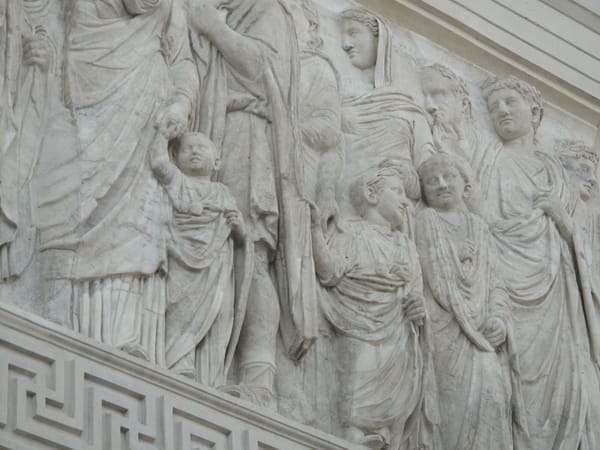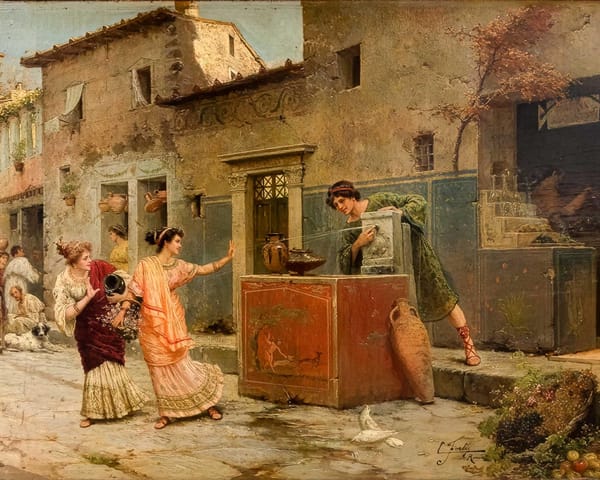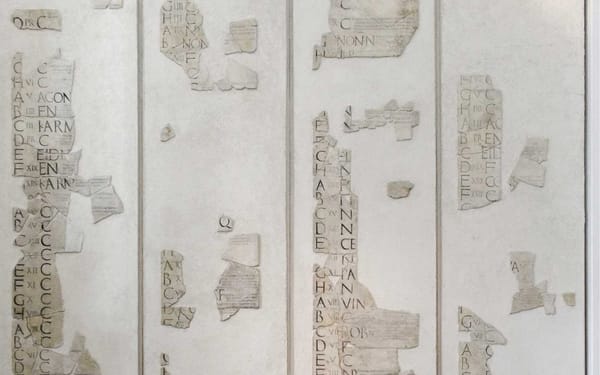Titus Livy: The Story of the Roman Celebrity Historian
Titus Livius, commonly known as Livy, was a Roman historian famous for his work Ab Urbe Condita ("From the Founding of the City"), a monumental history of Rome that spanned from its legendary founding in 753 BC to Livy's contemporary period in AD 9.

Would you travel from Spain to Rome, and then back again, just to lay eyes on the historian you adored? Livy had such a fan, before the likes of entertainers comme Taylor Swift and various rock stars, making him the first (and possibly, only) celebrity historian.
Although much of Livy’s work is lost, the surviving portions provide a critical narrative of Roman history and cover major events such as the early Roman Republic, the Punic Wars, and the rise of Julius Caesar and Augustus.
The details of Titus Livius' life are largely unknown, with most of what we do know coming from a few anecdotes passed down by later writers. These may have been sourced from a now-lost work by the Roman biographer Suetonius, titled Historians and Philosophers. The Christian writer Jerome, a reputable chronographer, indicates that Livy was born in 59 BCE and died in 17 CE, and there is no evidence to contradict this.

This places Livy as a near contemporary of Octavian, who became the first Roman emperor Augustus in 27 BCE and ruled until 14 CE.
Octavian - the Emperor Augustus. Credits: david__jones, CC BY 2.0
It is clear from Livy’s own writings that he was born in Patavium (modern Padua), a fact that was later mocked by the historian Pollio for Livy’s Patavian accent. Nothing concrete is known about his parents, and while several inscriptions from Padua mention individuals with the surname Livius, none can be definitively linked to the historian.
However, it is likely that Livy came from the provincial elite, with enough wealth to afford a solid education, though not the higher level of education that would have taken him to places like Athens. His limited proficiency in Greek suggests that he did not study abroad, and his History of Rome offers no signs of him traveling to Greece.
Padua was part of the Roman province of Gallia Cisalpina, which was governed by Julius Caesar during Livy’s youth. It is likely that Livy heard many stories about Caesar's campaigns in Gaul, though Livy himself never grew accustomed to military matters. His lack of knowledge in warfare, as well as his limited political experience, might have typically disqualified him from being a historian. However, despite these limitations, Livy was still able to craft a highly regarded account of Roman history.
Understanding Livy through his Work
The value of Livy’s history lies not as much in its depiction of earlier eras as in its reflection of Roman thought during his time. While parts of his work may be considered myth or unverified tradition, it offers a clear insight into what the Romans believed about the foundation of their state and the events that shaped its progress.
Although some of the historical "facts" may be regarded as imaginative tales, these stories were deeply embedded in the collective mindset of Livy’s contemporaries, as evidenced by the story of Aeneas. This myth, which originated from Greek sources, became the foundation of Virgil’s Aeneid and was so ingrained in Roman belief that, as noted by Tacitus in his Annals, during the funeral of Drusus in AD 23, Aeneas and other legendary figures were prominently represented.
Although modern historians might critique these stories as aetiological or purely invented, they were believed and taught by the Romans and serve as a window into the collective consciousness of Livy’s time.

The Roman State had clearly defined political, religious, and social structures, along with well-established traditions regarding their origins. While the true beginnings of many of these institutions were shrouded in the distant past, the Romans held strong beliefs about how they were formed.
For instance, they believed that their religious practices were introduced by Numa, their constitution by Servius Tullius, and the war declaration formulas by Ancus Marcius. Although the actual historical accuracy of these origins might be uncertain, it did not diminish the effectiveness of these institutions. The stories of their creation represented Roman thought and interpretation, projecting a grand past to legitimize the present.
Even if Livy does not present concrete facts, he reflects the collective Roman mindset and is himself a proponent of these early traditions. From Livy's reflections throughout his work and from his own statements, we can understand him as a Roman deeply rooted in the values and beliefs of Rome's earlier, more virtuous days.
Strong in his religious convictions, he critiqued the superficial aspects of popular belief while writing with reverence about the significant events that had shaped the Roman State. Livy’s worldview suggests that, if placed in the past, he would have fit seamlessly into early Roman society, where the father served both as priest and ruler. While Livy does not trace the development of the early family unit into the Roman State, he demonstrates that despite the frivolities and changes in Roman life, a profound current of religious thought persisted.

Livy acknowledges that parental authority had diminished, many traditional beliefs had faded, and new and unfamiliar ones had emerged.
Romulus and Remus collected by Faustulus. vers 1643. Louvre. Credits: jean louis mazieres, CC BY-NC-SA 2.0.
Yet, beneath these shifts lay a great historical legacy and a strong present, both of which were grounded in Rome’s early days. With pride, Livy highlights that many ancient institutions remained significant in his time. The old Capitol stood amid the grandeur of Augustus' Rome, the Ten Tables formed the foundation of the legal system, and the valor of old Italy still contributed its soldiers, even though the population had declined. The integrity of ancient Roman valor, which rejected deceit and treachery, remained a point of pride, valuing victory through strength over trickery.
Roman history was a blend of both fact and fiction, and understanding it required the same intellectual effort to grasp both. For instance, a schoolboy’s effort to memorize the names of Rome’s seven mythical kings and the lengths of their reigns was as demanding as if they had been real historical figures.
Even if it were proven that certain characters were mythical, stories merely aetiological, or well-known sayings were pure fabrications, their importance to Roman thought remained unchanged—similar to how a once-favored text, later discredited by modern criticism, still holds historical value, or how a once-believed physical fact retains its significance even after being disproven. Livy likely did not stand alone in these intellectual beliefs but was representative of many Romans, making his works a useful reflection of the mindset of his time. (Livy, by R. B. Steele)

Livy and his Style as a Rhetor
The vast body of criticism on Livy's History of Rome often focuses on his merits and flaws as a historian, his exceptional style, and his relationship with his sources. However, this paper primarily aims to explore how Livy can be regarded as an orator.
Influenced by the political environment during his youth and his education, Livy was inclined towards a career in oratory. Born in 59 BC, Livy lived through a period of political turmoil, witnessing the final struggles for liberty in Rome and the rise of Augustus. He grew up alongside great orators like Cicero and was exposed to the politically charged atmosphere that fueled eloquence.
Livy’s proficiency in public speaking and philosophy was a key part of his Roman education, and his early works, including a semi-historical, semi-philosophical dialogue, reflect this interest. Seneca even linked him with Cicero and Asinius Pollio in terms of eloquence.
Livy’s historical writing, particularly the inclusion of direct speeches, reveals his admiration for oratory, as noted by ancient authors. He criticized Sallust for trying too hard to emulate Thucydides and deeply admired Cicero, especially his eloquence in the Philippics. Cicero's influence is evident in Livy’s adherence to the ideal that history and oratory should have a smooth, continuous flow without the harshness of courtroom rhetoric.

Livy’s early education and taste for rhetoric made him well-suited for the roles of orator and rhetorician.
A bust of Titus Livius. Credits: Europeana, CC BY-NC-SA 4.0
However, when he began his career around the time Augustus rose to power, there were few opportunities for traditional oratory. After years of civil strife, Romans were yearning for peace, and political debate had largely disappeared as the emperor held control over public affairs. The era of Ciceronian oratory had passed, as public discussions in both the Senate and the Forum were severely restricted under Augustus, a trend that had begun under Julius Caesar.
Public gatherings became less frequent, and the courts increasingly served as tools of the emperor's will. The environment that once nurtured eloquence under the Republic had fundamentally changed. The "silencing of the tongue" symbolized more than just political repression—it marked the end of oratory as a viable career.
Even distinguished orators like Asinius Pollio and Valerius Messalla had to withdraw from public speaking and turn to literature to maintain some semblance of independence. For many, the decline of oratory meant adapting to the new norms where rhetorical exercises replaced genuine public debate.
However, Livy did not embrace this shift. Staying true to his early leanings, he chose to express his eloquence through a medium the monarchy allowed more freedom—historical writing. In this form, Livy was able to merge his deep admiration for the old Republic with a measured loyalty to the new imperial regime.
Through his writing, he idealized the virtues of early Rome, such as simplicity, piety, and justice. Though public oratory had been stifled under the Empire, Livy became a historian in order to preserve the spirit of the orator. His work allowed him to embody the eloquence that had once been displayed by figures like Antony, Crassus, Cicero, and Caesar.
The rhetorical nature of Livy's historical writing has been widely acknowledged and examined, and it is unlikely to go unnoticed by any discerning reader. Critics, have come to a more nuanced understanding of Livy's objectives and methods. They recognize that his work should be appreciated as both literature and history, with his strengths lying more in the artistry than in the scientific precision of historical writing.
In shaping his work with a rhetorical flair, Livy aligned with both the literary traditions of his time and the ancient view of history, which aimed to captivate and entertain through style. As Roman political institutions evolved, so too did language and literary tastes. Prose had reached such a level of refinement that writers of the period felt compelled to experiment with style to avoid stagnation. This shift led some to prioritize elegance over factual accuracy, often sacrificing substance for the sake of stylistic flourish.
Livy resisted this trend, maintaining a clear and unadorned language, favoring the works of earlier orators, whose speech he wished to preserve. He sought to uphold the dignity of history by avoiding the excessive ornamentation and bombast typical of his time, opting instead for a natural, refined style.
Livy balanced the need to enliven his narrative with an adherence to taste and judgment, refining Cicero's sentence structure to an even greater level of sophistication. He recognized the advances made by poets in elevating the Latin language and understood that a change in times required a shift in speech.
Consequently, his prose adopted poetic elements, integrating phrases and imagery from poets like Vergil, as well as references to Homer and Hesiod. Scholars have even identified Latin verses in Livy's work, whether direct echoes of poetry or so polished that they may have come from lost sources. ("Livy the Orator" by H. V. Canter)

Livy as the World’s First Celebrity Historian
Livy might have been one of ancient Rome’s most celebrated historians, but he also garnered an immense following during his lifetime, including a devoted fan from Gades (modern Cádiz, Spain).
This admirer traveled the great distance from Spain to Italy solely to meet Livy, demonstrating the historian’s widespread fame. The fan's journey is emblematic of Livy's celebrity-like status in the ancient world, much like how modern public figures are revered. According to Pliny the Younger, this man, after finally meeting Livy, immediately returned home, having fulfilled his sole desire just by seeing him. This anecdote illustrates Livy's far-reaching influence and his impact on readers across the Roman Empire.
Pliny's retelling of this story emphasizes both Livy's personal charm and his intellectual appeal. The journey of the Spaniard to Rome serves as an early instance of literary fandom, comparable to how contemporary readers might travel long distances to meet their favorite authors. Livy's historical works played a crucial role in shaping Roman identity, and his writings were enjoyed not only by scholars but also by the general public, further cementing his widespread fame.
This anecdote is a remarkable testament to how Livy transcended the role of a historian and became a figure of admiration in his own right. The man’s desire to meet Livy suggests that, even in the ancient world, scholars could attain fame that rivaled that of poets and politicians. His works allowed Roman citizens and those from distant provinces to connect with their shared heritage and history, further cementing his status as the "world’s first celebrity historian."
Livy’s influence persisted well after his death, with his historical texts continuing to shape Roman and later Western perspectives on governance, morality, and history. His narratives not only served as a chronicle of Rome's past but also provided moral lessons that resonated deeply with his readers. Even centuries later, his legacy as a storyteller and thinker endures, and the journey of his admirer from Gades remains a powerful symbol of Livy's far-reaching impact in the Roman world.

Criticism on Livy’s Work
Although immensely famous, Livy has been criticized for not providing a broad, cohesive vision or interpretation in his History of Rome. Some extreme perspectives argue that his work consists merely of a series of disconnected episodes. Even more moderate scholars note that Livy appears to exercise limited control over the overall structure of his narrative.
This has led researchers to focus on isolated scenes in which Livy emphasizes unchanging values, as earlier efforts to identify a larger unity within his work have been largely unsatisfactory. Attempts to find coherence in Ab Urbe Condita have often relied on recurring themes or intricate structural symmetry, but these approaches fail to offer any meaningful unifying effect for the reader.
One of the most frequent criticisms of Livy is that his work is considered a "prose epic" without a guiding interpretive framework, earning him more reproach than praise for his poetic approach. Livy is often admired for his portrayal of individual scenes—his literary artistry is generally acknowledged in his depiction of characters or events on a smaller scale, rather than in his control of a larger narrative.
However, some scholars, such as Erich Burck (a German classical philologist) in 1934, have challenged the notion that Livy's work lacks unity. Burck argued that Livy carefully crafted the beginnings and endings of his books to create a sense of order, particularly in the first pentad of the Ab Urbe Condita.
R. M. Ogilvie (a British scholar of Latin literature and classical philology) expanded on Burck’s work, suggesting that while individual books may not have overarching unifying themes, they do possess distinct "flavors" based on the events they cover. For instance, Book II is characterized by themes of liberty, Books III and IV by modesty and moderation, and Book V by piety. Book I serves as a declaration of Rome’s greatness and sets up the thematic structure for the rest of the books.

Nonetheless, some critics believe that Livy's reliance on his sources and his episodic composition process limited his ability to design a large-scale, cohesive narrative. These factors have led some to question whether Livy had any overarching plan for his history or if he was simply constrained by the material he worked from.
T. James Luce (Kennedy Foundation Professor of the Latin Language and Literature at Princeton University) made significant strides in demonstrating Livy's broader contributions to the structuring of his historical narrative. Luce argued that Livy undertook a preliminary phase of composition before actual writing, during which he planned and "blocked out" large sections of material for focused treatment.
His analysis of Books XXXI-XLV, which aligns with the findings of scholars like Burck and Ogilvie, reveals that Livy carefully selected specific events for detailed focus at strategic points—whether at the beginning, middle, or end of individual books. This methodical approach to organizing his narrative suggests that Livy’s work was not episodic or improvised, but rather thoughtfully constructed through careful and methodical, prior planning. (“A historiographical study of Livy, Books VI-X” by Lipovsky, James Peter)





About the Roman Empire Times
See all the latest news for the Roman Empire, ancient Roman historical facts, anecdotes from Roman Times and stories from the Empire at romanempiretimes.com. Contact our newsroom to report an update or send your story, photos and videos. Follow RET on Google News, Flipboard and subscribe here to our daily email.
Follow the Roman Empire Times on social media: